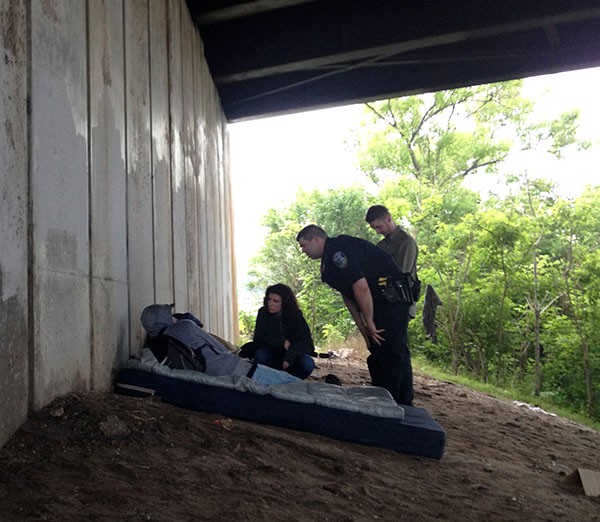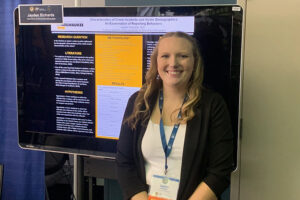
“There’s three things that make a person homeless – alcohol and drug abuse, mental issues and ‘shit happens.’”
Harold Sloan, one of seven Milwaukee homeless men profiled in 30 Seconds Away: Breaking the Cycle, uses those words to sum up the lives of those who sleep on park benches, under bridges and along our riverbanks. Sloan is one of the many people interviewed for the feature documentary, which makes its debut at the Milwaukee Film Festival at 6:30 p.m. on Tuesday, Sept. 29, at the Oriental Theatre.
Director Faith Kohler and producer and UWM alumna, Jessica Farrell, tell the story from many viewpoints. In addition to the seven homeless men who are profiled, they interviewed a judge, local attorneys, officers on the Milwaukee Police Department’s Homeless Outreach Team and advocates who work with the homeless. Nationally and locally, the film’s trailer and early fundraising efforts have already captured the attention of policymakers and advocates for the homeless.
‘Underground’ project gets noticed
After years of “working underground” on the project, the filmmakers and their documentary came to the attention of local leaders last June, during a symposium on homelessness and panhandling. Mayor Tom Barrett and County Executive Chris Abele were present as the film’s trailer premiered at the symposium. At that event, Barrett and Abele announced the “Housing First Initiative” to end chronic homelessness in Milwaukee within three years.
“That was a step in the right direction,” Farrell said. “To have the community talking is making us hopeful.”
When the trailer was posted online after the panel discussion, the filmmakers got calls from homeless advocates and policymakers as far away as Florida, Texas and California.
“The documentary has been successful in getting discussions going, and not just in Milwaukee,” Farrell said.
Beneath layers of homelessness
The documentary looks at the complex issues surrounding homelessness – with men who are constantly cycling between the streets and jail cells. If people are not ignoring the homeless, they are afraid of them, or simply do not know how to help, Farrell explained. “They see a guy sleeping on a park bench and they call the police.”
Citations are a common outcome when a homeless individual is addressed by the police – a practice that happens in cities and communities throughout the U.S.
“We’re coming to realize that ticketing them isn’t helping,” Farrell said. “It’s just perpetuating the system. Our justice system is not there to aid them. It deals with the aftermath. It treats behaviors, but doesn’t address prevention.”
Many of the homeless suffer from mental illness and substance abuse, and are often difficult to reach and to help, according to Farrell. They can’t be forced to seek treatment or take prescribed medication. The homeless population is often hidden and distrustful of police and society, Farrell said. “It’s not an easy film, there’s not an easy way out.”
Documenting survival on the streets
In 2009, Farrell was a UWM film major who met Faith Kohler through UWM film professor Dick Blau (now emeritus). Farrell described Kohler, a Marquette Law School grad, former federal agent and advocate for the homeless, as “really the heart of this [project].”
Kohler wanted to share the story of Milwaukee’s homeless, and was doing short interviews with her smart phone, but decided she needed a filmmaker to help tell the larger story.
At the time, Farrell and another film student, Alex Block, now a UWM alum, were already exploring the city and filming within abandoned buildings that filled its urban landscape. (Block is one of the directors of cinematography for the documentary.) As they filmed, they got to know the people who lived in these abandoned spaces, often bringing sandwiches, mittens and scarves to their new friends, whom Farrell called the “homeless gentlemen.”
Farrell and Kohler starting producing “30 Seconds Away” in 2009, working around classes, full-time jobs and other interests. Farrell graduated from the Peck School of the Arts in 2012, earning a BFA in film and photography. She and Kohler found help from many colleagues in Milwaukee’s tight-knit film community, ranging from cinematography and editing to work spaces and test screenings. Now that the film’s premiere is getting closer, they are reaching out to more community partners such as the Guest House, food pantries, local churches and professors at Marquette and UWM.
They see Milwaukee moving in a positive direction. “Unlike other cities that are turning to more punitive measures, our city is trying to address this in a more positive manner,” Farrell said. “As a community, we can stop turning the other way and come together to make change.”






